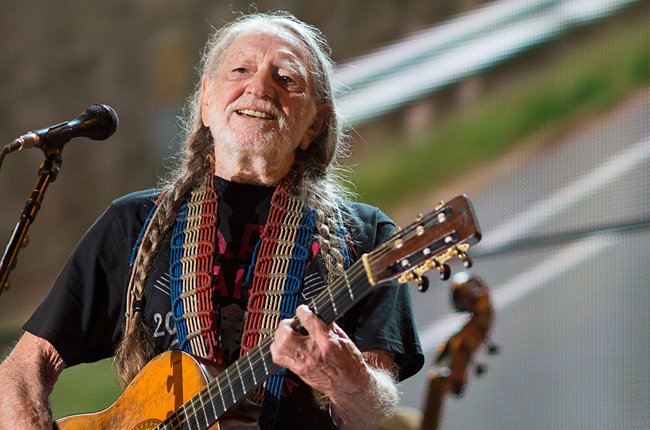The guiding foursome of Farm Aid — Willie Nelson, Neil Young, John Mellencampand Dave Matthews — will celebrate a milestone for the organization that supports America’s family farmers with a 30th-anniversary concert in Chicago on Sept 19, featuring Imagine Dragons, whose album Smoke and Mirrors topped the Billboard 200 on its arrival in March.
Also on the bill for Farm Aid 30 at the FirstMerit Bank Pavilion at Northerly Island in Chicago will be: Jack Johnson, Kacey Musgraves, Old Crow Medicine Show, Mavis Staples, Holly Williams, Lukas Nelson & Promise of the Real, Insects vs Robots and Blackwood Quartet. Tickets for the concert go on sale Aug. 3. A Farm Aid 30 app will be released for iPhone and Android. A social medium campaign around the show has begun using the hash tag #Road2FarmAid.
“We organized the first Farm Aid concert in Illinois in 1985 to respond to the people suffering during the farm crisis,” says Nelson, president and founder of Farm Aid. “Thirty years later, in Chicago, we’ll bring together so many of the people — farmers, eaters, advocates and activists — who have made the progress of the Good Food Movement possible. At Farm Aid 30 we’ll celebrate the impact we’ve had and rally our supporters for the work ahead.”
Farm Aid has its roots in the mid-’80s era of music activism. On July 13, 1985, onstage in Philadelphia at Live Aid, the concert for African famine relief, Bob Dylan remarked to the crowd: “Wouldn’t it be great if we did something for our own farmers right here in America?”
At the time, falling crop prices and rising debt payments had ignited a wave of foreclosures that were pushing family farmers off their land.
Nelson organized the inaugural Farm Aid on an all-but-impossibly-short lead time at the University of Illinois Memorial Stadium in Champaign on Sept. 22, 1985. It is has been staged every year since, at venues around the country, and is the longest-running concert for a cause in pop music history.
In the 30 years since, Farm Aid has persevered in its mission, supporting America’s family farmers with programs year-round. The organization also has become a key promoter of developments in the wider Good Food movement in the United States: the growth of farmers markets, the rise of community-supported agriculture groups, the spread of farm-to-table “slow food” restaurants and the wider use of sustainable farming practices.
“In 1985, alternatives didn’t exist for most farmers and people didn’t understand that there was a role for them in changing the system,” says Mellencamp. “The Good Food Movement didn’t exist. People thought the farm crisis was a rural problem. “But after that first concert, people listened. They realized that if we lost family farmers, we lost Main Street and we lost our food. They stood up with family farmers and now things are changing. We’ve got a lot more work to do, but the connection between rural and urban communities is more real and important to people.”
Farm Aid co-founder Young targeted industrial farming giant Monsanto and its use of genetically modified seeds on his current album The Monsanto Years, and he’s touring to support the album this summer with Promise of the Real, the band that includes Nelson’s sons Lukas and Micah.
More than a concert, Farm Aid serves as an annual gathering of activists focused on food issues, environmentalism and social-justice battles. Many farmers and activists travel to the event each year to network, share strategies, listen to the music and eat family farm food on a menu that Farm Aid has trademarked as “Homegrown.”
While the Sept. 19 show is the first for Farm Aid near downtown Chicago, the organization has staged four previous concerts in Illinois, beginning with the first in Champaign and three more (1997, 1998 and 2005) in Tinley Park, Ill.
“The first Farm Aid concert sparked a family farm movement that has rallied hundreds of thousands in support of a system of agriculture that’s good for family farmers, good for the economy, good for the soil and water and good for all of us,” says Carolyn Mugar, executive director of Farm Aid, which is based in Cambridge, Mass.
“Over the years, we’ve heard from so many people how crucial it is that we continue to work together and stand shoulder-to-shoulder with family farmers as we fight for change,” says Mugar. “At Farm Aid 30, we’ll celebrate the many actions — small and large — that we are all taking to make a big difference for family farmers. We’ll take stock of 30 years of action and strengthen our commitment to work for change in our farm and food system.”


